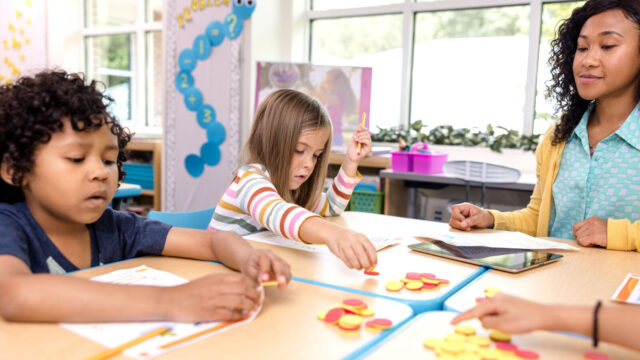
No matter what the activity is, the way to improve is practice, practice, practice. (Though some forms of practice are better than others.) During the school year, students get regular math practice under the guidance of a teacher.
But math summer slide is a common problem. Students are prone to lose progress in learning math over the summer. In fact, this phenomenon is especially apparent in math, where many students fail to see the relevance to the rest of their lives and many families don’t feel confident in helping their children practice.
Summer Math Games and Activities
Fortunately, there are plenty of summer math activities that teachers and family members can do with students to keep their math skills sharp all summer long. These games and activities can be repeated throughout the summer, and we encourage you to customize them to the children’s interests. If being used in a more formal school setting, these can also be useful summer school math activities.
1. Play a Card or Board Game
Who said learning math couldn't be fun? There are plenty of games that have been designed with math learning in mind, but practically all games have some sort of strategy or scoring that can make for good math talk. Choose any game you already enjoy playing that includes points, money, or strategic thinking—which gives you an awful lot of options! Look for ways to layer math discussion on top of the game:
- What strategy did you use?
- How would your score change if you had made this move instead?
- What types of game decisions take the most time to decide on?
- What decision would give you the greatest chance of winning?
2. Play an App or Video Game
You can always make the game digital! Even a less gamified digital experience can help to make math more engaging. This can be an app offering targeted math practice (such as our practice app, Waggle), or it can be any game that your students or children like to play. When using a general entertainment game, look for ways to discuss the game after students are finished playing or, if appropriate, while they’re playing. Many of the same questions about cards or board games apply here, too.
3. Cook or Bake Together
Making food involves some standards for mathematical practice, such as attending to precision, but it also requires attending to some specific mathematical skills such as arithmetic and ratios. While cooking or baking, look for mathematical questions and decisions. You can ask questions such as:
- Do we need more or less flour?
- How much sugar would we need if we were to cut the recipe in half?
- How much longer should it stay in the oven?
Look for ways to incorporate math talk even before you start (for example, “How would you measure a quarter cup?”) and after you're done (for example, “How many portions does this make?”).
4. Print Out or Download Independent Activities
This is a broad category of course, but especially useful if you are short on time or lack comfort with teaching math. We regularly offer free games, activities, and downloadable worksheets to meet your children’s age and interests, with varying amounts of input and customization required of the teacher.
You might want to explore our full library of free math resources, or check out some highlights below:
- Math at Work: Meet Industry Experts to Explore Jobs That Involve Math (Grades 3 and up)
- Video: Teaching Math with Art at the Metropolitan Museum of Art (Grades 3 and up)
- Fun Summer School Activities for Elementary and Middle School Students
- Free Math Activities for Kindergarten
- Free Math Activities for 1st and 2nd Grade
- Free Math Activities for 3rd, 4th, and 5th Grade
5. Analyze Sports
Sports are full of math. For younger students, the activity can be as simple as adding up goals, identifying shapes, or discussing the difference between 2- and 3-point shots. As you watch together, be sure to ask math-minded questions such as “Who has more points?”
For students who are ready, look for examples of statistics mentioned in the commentary, decisions that can be modeled using equations, and strategies that can elicit deeper mathematical discussion. For instance, you could compare a baseball player’s on-base percentage versus batting average or point out the advantages of kicking a soccer ball from different angles.
6. Play a License Plate Game
Trying to keep your children’s math minds sharp while on the road? Make a game out of license plates! For young children, the game can simply involve adding up the numbers. Who can be the first person to find a “10?”
For children who are ready, challenge them use the numbers on the license plate and the four basic operations to get 24. (For example, if a license plate has 9, 1, 2, and 5, then you can make 24 by arranging the numbers as (9 – 1) × (5 – 2).)
7. Take a Field Trip
If you’re fortunate to live near a science (or even math!) museum, spend time looking at how numbers, equations, data, and critical thinking go into different discoveries, inventions, and phenomena. This activity does not need to be limited to science and math museums. If you’re looking for it, math can truly be found anywhere. You can make math lessons out of art museums or even go on a free virtual field trip. Or forget the museum altogether and take a field trip to a new park or building. Keep an eye out for signs with shapes and numbers on them.
8. Go Birdwatching
No matter where you go, birds are everywhere! Take a moment to go outside and look for birds (often called “birding”). If you have a pair of binoculars, here’s a tip from birder Christian Cooper: “When you see a bird, you want to keep your eyes on the bird. Find the bird first with the naked eye, keep your eyes on the bird and bring the binoculars to your eyes.” While looking at birds may not seem mathematical, there are many ways to elicit math talk while birding, with questions appropriate for math learners of any age:
- Is that bird big or small? Which bird is smaller?
- What are different ways to categorize the birds?
- How would you describe the path that the bird flew?
- What data points would be interesting to keep track of?
Keep track of the birds you see, too. Once you’re done, the birds seen can be organized into a graph or table. This opens up questions about analyzing the data:
- How many birds did you see in total? Which bird did you see the most?
- What is the probability of seeing a specific type of bird?
- Where could you go to get similar data?
- Where do you think you would get the most interesting data?
9. Track Goals
Want to combine math with whatever your students like? Identify a skill they want to get better at, and then turn that into summer math practice!
Make a chart and measure progress. Work with them to identify something they want to improve in, such as reading, basketball, or playing an instrument. Then decide on a way to measure progress, such as pages read, shots attempted, or minutes practiced. Finally, record what they do either in a notebook or digitally.
Use the records to have thoughtful conversations about goals and progress. Consider probing questions such as “Do you see a correlation between amount practiced and your performance?” or “If you practiced 10% more every day, do you think you would be 10% better?” We have a free handout to support this activity as part of our Math at Work series (see Activity 5: Setting Goals).
***
Learn more about our easy-to-implement summer school programs. Visit the HMH summer school site.
Get our free Math Intervention eBook.












